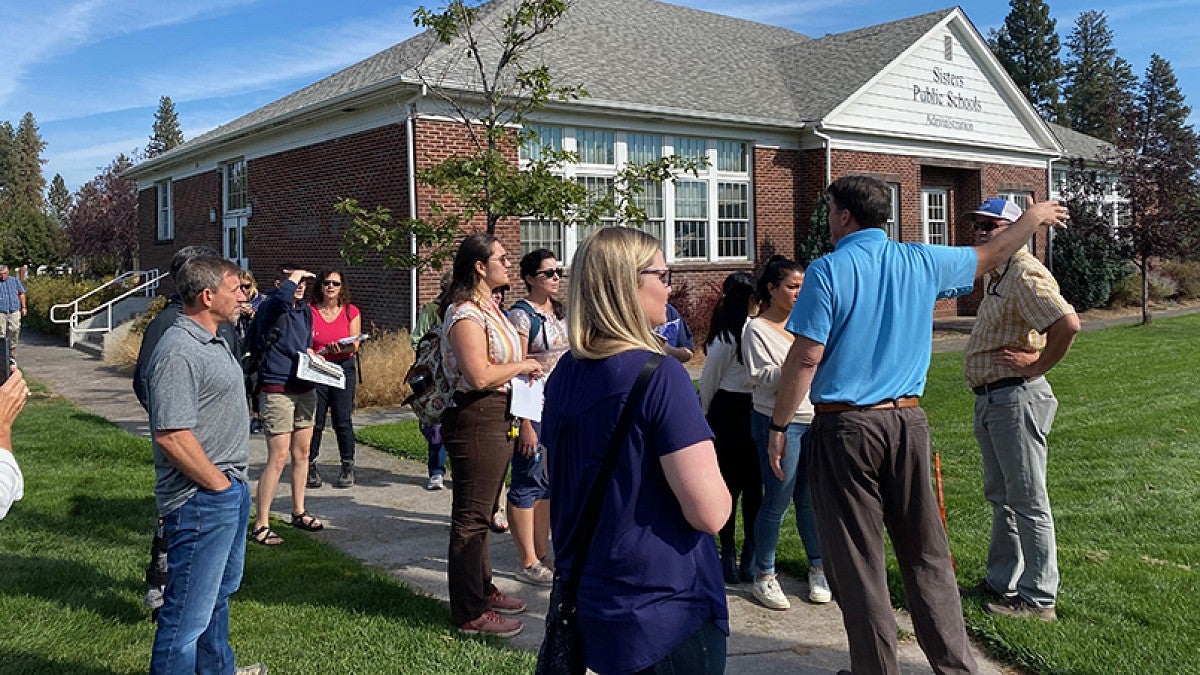In its 14th year, the UO’s Sustainable City Year Program is partnering with the city of Sisters, an Oregon community east of the Cascades.
Part of the UO Sustainable Cities Institute established in 2009, Sustainable City Year partnerships connect University of Oregon students across campus with local communities. Selected cities receive expertise in sustainable planning to improve the community, while students get hands-on experience and preparation for public-service oriented careers. This fall, three classes in the College of Design’s School of Planning, Public Policy and Management are focusing on Sisters.
Located at the foot of the Cascades mountains in Central Oregon, Sisters offers stunning natural surroundings, year-round recreational opportunities, and a vibrant local economy. With a population of more than 3,000, the city is also experiencing significant growth.
Using site-based planning and design proposals, graduate students in the community and regional planning classes will envision future uses for an elementary school in Sisters that will be vacated once a new school is built at a different location.
“One fantastic, and very unique, aspect of the fall project is that three different public entities are engaging around the same redevelopment site: the city of Sisters, Sisters School District and Sisters Parks and Recreation District,” said Megan Banks, an instructor in the School of Planning, Public Policy and Management and director of the Sustainable City Year Program.
Throughout the year, students will have the opportunity to work on a variety of projects, from alternatives to fund affordable housing to envisioning future options for the existing elementary school site.
“Students will get a firsthand look into the complexity of local decision-making even as they put together their forward-looking ideas,” Banks said.
A virtual open house is posted online, and winter and spring term courses also will be added throughout the year as project and course matches are made.
“Rethinking a site in Sisters requires looking at it through different areas of expertise,” said Marc Schlossberg, a planning, public policy and management professor and co-founder and co-director of the Sustainable Cities Institute. “We are particularly excited that the outputs of city planning students in the fall will be inputs for architecture students in the winter and spring.”
Students kicked off the project Oct. 7 with a visit to Sisters to meet with the partners in person and start the visioning process.
“After visiting the Sisters site, students were both excited and overwhelmed by the opportunity to be of help to the local community,” Banks said, “but one thing was clear to all: They want to honor the community’s values even as students think big with creative, forward-thinking ideas.”
Through applied learning, Sustainable City Year invites the innovation of students and faculty to offer communities unique perspectives and ideas. Communities emerge from the partnerships with increased outreach, expanded breadth of conversation, and cutting-edge solutions, while students have the opportunity to gain real-world experience ahead of entering the public service-oriented workforce.
“This interdisciplinary work is extremely beneficial for the community itself; it gives students an understanding of where their own developing expertise fits, and it’s a good example of the rethinking of higher education embodied in the UO’s new Environment Initiative,” Schlossberg said.
Previous partners in Oregon have included communities as varied in geography and population as Salem, Hermiston, Portland, Medford, Silverton, Springfield, Albany and Gresham.
—By Sharleen Nelson, University Communications


